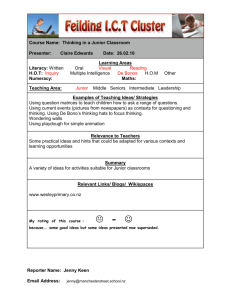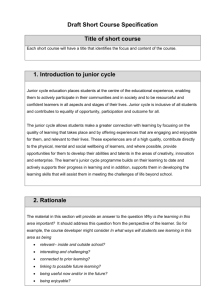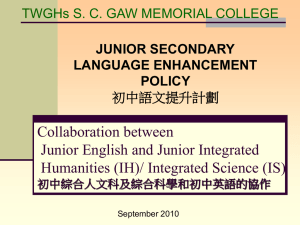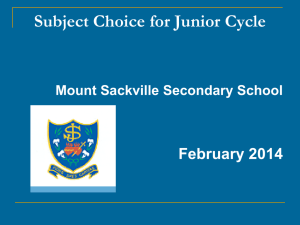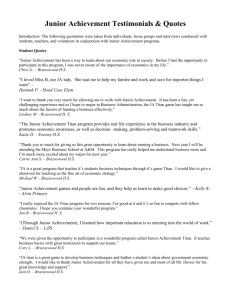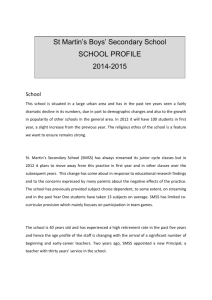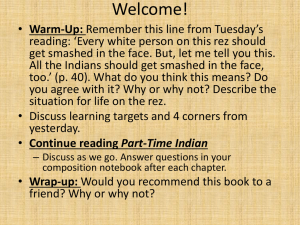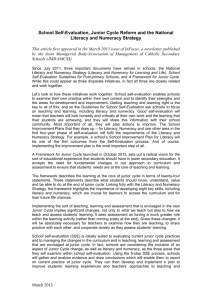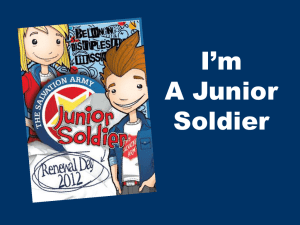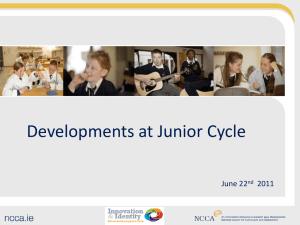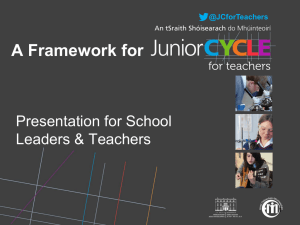Learning - Junior Cycle Home
advertisement
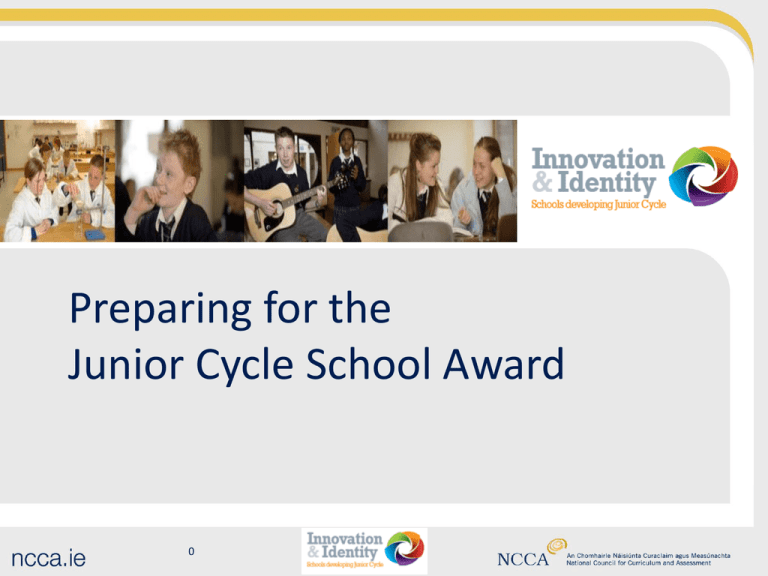
Preparing for the Junior Cycle School Award 0 Aim of this workshop • To gain clarity regarding changes to junior cycle • To consider how our school can get started in planning and implementing the change 1 Presentation slides • Why change? • What’s different about junior cycle? • What do you see as the opportunities and challenges for our school? • How can we get started? 2 Why change? • ESRI research - evidence base for junior cycle review • 1st year, 2nd year, 3rd year • nature of engagement • Request for advice from Minister and DES • Innovation and Identity- Ideas for a New Junior Cycle (2010) discussion paper 3 And of course, PISA… • A need to focus on literacy and numeracy • A need for connections and progression • Student resilience and persistence 4 5 What’s the difference? • A Framework – not rules! • Greater flexibility and autonomy for schools • Clarity on junior cycle learning – a different kind of core • Focus on the programme as well as the exam • Access to a more varied curriculum/curriculum development • Teachers in closer relationship with assessment • Improved feedback, reporting and modern qualifications 6 What’s the difference? A Framework – not rules! Greater flexibility and autonomy for schools! 7 What’s the difference? Clarity on junior cycle learning – a different kind of CORE! 8 Learning • What a student will learn is described in 24 statements of learning • The skills of literacy and numeracy and other key skills embedded in learning and the curriculum 9 10 11 12 13 What’s the difference? Access to a more varied curriculum 14 Curriculum • Subjects continue as the main curriculum components • Schools can offer short courses and other learning experiences • Subjects will be shorter Level 2 Qualification Business Studies Classics French Digital Media Geography History Home Economics Irish Italian Jewish Studies Subjects German Materials Technology (Wood) Mathematics Social, Personal and Health Education Chinese Physical Education Artistic Performance Programming/Coding Potential Short Courses Civic, Social and Political Education English And school developed short courses Communicating and Literacy Numeracy Looking after myself Priority Learning Units Art Craft Design Living in a community Preparing for work Other areas of learning Such as… Guidance Music Tutorial time Religious Education Choir Science Etc. Skills Metalwork DEAR (Drop everything and read) Spanish Technical Graphics Technology 16 Phasing of new subjects in JCSA 17 What’s the difference? Assessment closer to learning and assessment supporting learning. 18 Main features of the Framework for Junior Cycle Features of Junior Cycle Assessment • Move towards school-based assessment • Mostly formative but linked to summative • Continual feedback to students on how to progress learning and performance • Based on clear outcomes-based specifications and expectations for learners • Annotated examples of student work illustrate those expectations Main features of the Framework for Junior Cycle Supports for Assessment • Clear specification of assessment tasks for the School Work Component • Features of quality used to assess those tasks also set out (grade by grade) • Process of school-focused moderation • Toolkit of assessment materials and guidance • Professional development and other practical supports • Some State Examinations retained and Final Assessment in all subjects • DES monitors assessment results Qualifications • Two qualifications – Level 3 and Level 2 • Reduced number of subjects included in qualification • Smaller qualifications, giving schools more flexibility and time to spend on deeper learning and on literacy, numeracy and key skills 21 Subject limit for qualification Eight subjects Nine subjects Ten subjects Or 7 subjects + 2 short courses Or 8 subjects + 2 short courses Or 9 subjects + 2 short courses Or 6 subjects and 4 short courses Or 7 subjects + 4 short courses Or 8 subjects + 4 short courses 22 Features of Level 2 Learning Programmes • Defined target group, range of settings • Based around Priority Learning Units (250hrs) • • • • • Communicating and literacy Numeracy Personal care Living in a community Preparing for working life • PLUs set out in elements and learning outcomes – a learning menu • School-based assessment 23 Website www.juniorcycle.ie In small groups discuss • What do you see as the opportunities that a new junior cycle will present to your school? • What do you see as the main challenge and how can this be overcome?
